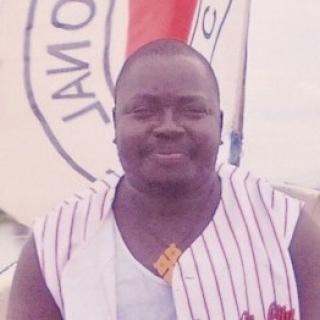Emmanuel Lukudu Kennedy Laki naît le 16 mai 1973 à Lainya, au Sud-Soudan, dans ce qui est aujourd’hui l’État de l’Équatoria central. Après avoir achevé la formation nécessaire, « Kennedy », comme l’appellent ses proches, commence à travailler comme chauffeur et mécanicien en 1993. S’il adore bricoler un moteur dans un garage, ce qu’il aime par-dessus tout, c’est être sur la route au volant d’un camion. Pour lui, conduire est autant une passion qu’une profession.
Kennedy a près de 20 ans d’expérience à son actif lorsqu’il entre en décembre 2014 à la délégation du CICR à Juba comme chauffeur de camion. Il ne tarde pas à en devenir un des chauffeurs les plus actifs ; il passe de longues périodes sur la route, sur du terrain difficile, et il lui arrive souvent de travailler, manger et dormir dans des conditions très rudimentaires. Ses cargaisons sont aussi variées que matériaux de construction, vaccins, vivres et autres secours non alimentaires. Il n’hésite pas non plus à se porter volontaire pour piloter des bateaux à moteur, finissant même par assurer la formation de collègues.
Il est travailleur, ouvert aux idées nouvelles et très apprécié de ses collègues, notamment pour son caractère facile et son sens de l’humour. Outre ces qualités humaines, il parle cinq langues : l’anglais, le kiswahili, l’arabe, le dinka et le bari. Lorsque les temps sont durs, ce qui arrive souvent, il fait en sorte que tout le monde garde bon moral. Pour lui, il est vital que chaque opération se déroule comme prévu, car des populations dépendent de l’aide acheminée. Comme le dit un collègue, Kennedy a bien compris le sens du mot « équipe ».
Le 8 septembre 2017, Kennedy conduit le camion de queue d’un convoi de dix véhicules du CICR revenant de deux semaines de distribution de nourriture en Équatoria occidental lorsque des hommes armés non identifiés ouvrent le feu sur le convoi près de Kotobi. Kennedy est touché et perd le contrôle de son véhicule. Ses collègues l’emmènent d’urgence dans un centre médical à Mundri, à 25 kilomètres de là, mais il succombe à ses blessures. Kennedy avait 44 ans ; il était marié et père de sept enfants (quatre fils et trois filles).
La mort de ce collègue au grand cœur et très respecté est un coup dur pour la délégation. Dans l’hommage qu’il lui rend lors d’une cérémonie commémorative à Juba un an plus tard, François Stamm, le chef de délégation, déclare : « Nous n’oublierons jamais Kennedy. Honorons sa mémoire et gardons de lui le souvenir de l’être humain joyeux, positif et heureux qu’il était. »
